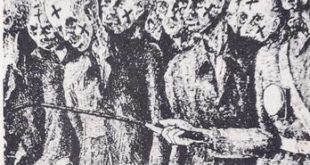Today we speak the words, “I am a World citizen,” with pride. To the people of the ancient world the statement, “I am a Roman citizen,” was a badge of high honour. Beginning as a small city state in Italy, Rome grew into a vigorous republic and finally into an empire so mighty that it included the whole of the Mediterranean world. Even after Rome’s grandeur had waned, its influence lived on among later peoples. Rome’s history is a reminder that the destiny of a nation rests more on the wisdom of its leaders and the character of its people than it does on military might and economic strength. Consider for a moment the two following scenes from Roman history. (1) The year is 216 B.C. It is a sad day in Rome. Word has just been brought of a great disaster. A Carthaginian general named Hannibal has invaded Italy and has just wiped out the Roman army that faced him. Rome’s allies are wavering in their loyalty. Some have already gone over to the enemy. An immediate attack on Rome is expected. Yet, the Senate (Rome’s council of state) refuses to give up hope and calls upon the citizens for fresh troops and supplies. It puts the city in a state of siege, or on the alert for final defense against destruction. It refuses to pay a ransom for Romans taken prisoners by the Carthaginians. When the Roman general who lost the battle returns with a handful of soldiers, he is not criticized. Instead, the Senate praises him for not giving up hope of saving the state. The confidence of the Senate was justified. Fifteen years later, it was Carthage and not Home that was conquered. In this crisis you see the Romans showing qualities which made them great: courage …
Read More »The Meaning of Totalitarianism
So it happened that in many parts of the world people were living under a system of government that came to be called totalitarianism. There were differences in the governments of the totalitarian countries, but they were alike in certain important ways. In each of them, the government was controlled by one political party, usually under a dictator and no other political parties were allowed. The ruling party was not satisfied to control the government; its aim was total control of the life of its people. It controlled the courts and the armed forces, labour and industry, science and the arts. In some countries, it controlled religion completely; in others, religious groups were allowed to exist so long as they did not challenge the power of the government. To keep their strict control of the people, the totalitarian governments set up a secret police and totalitarian countries were often called “police states.” The people had no civil liberties and no part in the governing of the country. They had to obey and do as they were told. If they did not, they risked prison, concentration camp, torture and death. As totalitarianism spread widely over the world, men began to wonder what had made it possible. The reasons were not too difficult to find . The end of World War I had left many countries, especially those that had been defeated, divided and disorganized. Their weak governments could not solve the problems that faced them. This gave “strong men” the chance to take over the government. Another important reason was the great depression that began around 1929. Business seemed to come to a standstill. Unsold goods piled up in warehouses, while factories shut down and millions of people were thrown out of work. Hungry people were willing to listen to anyone …
Read More »

